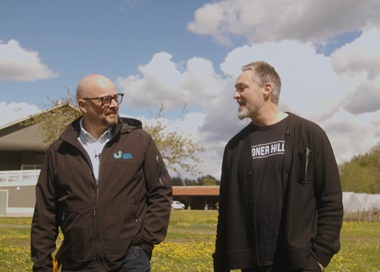
Dean Kurpjuweit of UGM (left) and Jason Roberts of Wagner Hills have become friends while working together. Image from video (below)
“Wagner Hills is a safe, beautiful place that provides healing and growth and transformation for people on the road to recovery.”
Those are the words of Wagner Hills Executive Director Jason Roberts. Not surprising, given his role – but clearly heartfelt, because he has lived those words himself.
Roberts has been leading Wagner Hills for the past 11 years, having walked through its gates addicted to heroin in 1998. He prepared for his current role by volunteering with Jackie Pullinger in Hong Kong, founding a recovery centre in Russia and initiating Recovery Church at Christian Life Assembly.
Wagner Hills began working with men in recovery on a 45 acre property in rural Langley (east of Fort Langley, not far from the Fraser River) in 1981.
Women’s Recovery
More recently, Wagner Hills leased another large piece of land and set up a centre for women. They have now decided to continue with their men’s work while agreeing to have Union Gospel Mission carry on their work with women.
A May 15 joint statement said:
For the last decade, Wagner Hills has provided Women’s Recovery programming in Langley. In 2023, Wagner Hills staff and board sensed God’s call to refocus on our original mission: providing a solid and transformative recovery program for men.
Recognizing this shift, we prayed for an organization that shared our values and could seamlessly continue the vital work of Women’s Recovery in the same location. Union Gospel Mission (UGM) emerged as the natural choice. Through a process of deliberation, prayer and discernment, both of our organizations discerned a clear path forward, sensing God’s assurance in our decision.
Embracing this season of transition, UGM is poised to open the doors of the new Cedar Haven Women’s Recovery Centre by July 1, 2024, ensuring continuity of care and support for women in need within the community.
Cedar Haven covers about 50 acres of hills, trees and farmland and hosts an 11-bed recovery centre, along with outbuildings that house a woodworking shop, a pottery studio and a gymnasium in south Langley.
UGM posted an announcement about the agreement; here is a portion:
Historically, across Canada, women have had fewer options than men when seeking out supportive recovery programming. At the same time, women are statistically more likely to face intimate partner violence and underreported housing insecurity, which means their journeys towards recovery are often more fraught. The opioid overdose crisis in British Columbia has underscored the urgent need for continued – and, where possible, expanded – recovery facilities for women. . . .
With Women’s Recovery facilities in Vancouver and soon-to-be facilities in Langley and Victoria, UGM has become one of the leading service providers for Women’s Addiction Recovery and Stabilization programming in the province.
A video (see above) captures UGM President Dean Kurpjuweit and Wagner Hills Executive Director Jason Roberts talking about the friendship that developed as the two groups discussed their common values and how they could work together.
‘On the road to recovery’
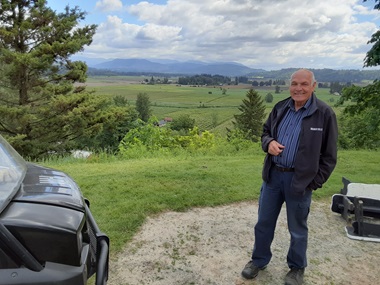
Helmut Boehm gave us a tour of Wagner Hills, which has a lovely setting.
I saw ample evidence of Jason Roberts’ description of Wagner Hills as “a safe, beautiful place that provides healing and growth and transformation for people on the road to recovery” when I visited Wagner Hills last week.
I was welcomed by Helmut Boehm, who co-founded Wagner Hills along with Wes Wagner. Helmut has been there since 1981, overseeing the site’s transformation. The central area is a hive of activity, with housing, a central administrative/meeting building, a barn and many vehicles.
He drove me (and a neighbour supportive of Wagner Hills) around the property, showing us the barn, some cattle on an upper field, greenhouses, gardens, workshops, woodland, a u-pick blueberry field and more housing.
Helmut clearly loves keeping busy, even though he is getting on a bit. One of his current projects is looking for good grazing spots for some more cattle which are currently at the Women’s Centre. He also enjoys creating (marginally negotiable) roads around the property which he clearly loves – and loves to share with guests.
He is a jack of all trades, ready to pitch in where necessary. Originally from Germany and raised in Alberta, he travelled widely and worked many jobs before before moving out to the farm that became Wagner Hills in 1981.
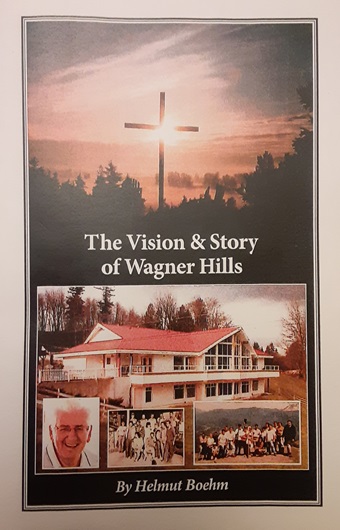 During that time, he worked with the redoubtable May Gutteridge, founder of St. James Social Services in the Downtown Eastside. In his short 2017 book, The Vision & Story of Wagner Hills, Helmut wrote, “In my view, she was Vancouver’s Mother Teresa.” She became one of the original board members of the Wagner Hills Farm Society.
During that time, he worked with the redoubtable May Gutteridge, founder of St. James Social Services in the Downtown Eastside. In his short 2017 book, The Vision & Story of Wagner Hills, Helmut wrote, “In my view, she was Vancouver’s Mother Teresa.” She became one of the original board members of the Wagner Hills Farm Society.
Another key player in the early days was Wes Wagner, who invited Helmut, his wife Linda and their three children to move to the farm:
I was disappointed. there wasn’t much there, just an old farm house and two dilapidated barns. It was hilly and muddy and had been a gravel pit. . . .
But move in they did, and they grew to admire Wagner, a strongly committed Lutheran believer:
In addition to donating his land and serving as a lifetime board member, Wes was actively involved in the day-to-day ministry of the men who came to Wagner Hills. In the early years, he would drive from Vancouver daily after picking up people in the city to bring to the farm
Wes’ gentle, caring nature built trust and eased tension on the ride to the valley. I remember at least four vehicles that Wes wore out in thousands of trips from Vancouver to Wagner Hills. I would guess he drove a million kilometres in support of this ministry.
Wagner passed away in 2017.
Helmut told me that Jason Roberts has described Wagner Hills as “a diamond in the rough” when Helmut was running it, and that he is working hard to make it “a well-set jewel.” He doesn’t take offence at such a characterization, noting, for example, that Jason is an effective fundraiser – an important quality for a work that relies primarily on the Christian community.
A light in the darkness
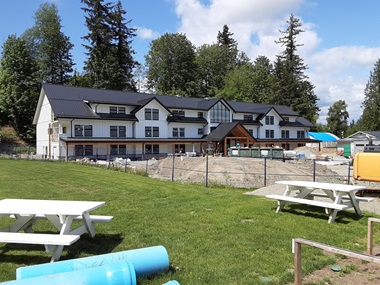
The Oak House will replace trailers as living quarters for the men this fall.
As we arrived back at the central area, he pointed to the new $14 million building project (with infrastructure) which will house the men when completed by the end of September.
The Oak House will replace the trailers which have been home to most of the men who normally live onsite. The new complex will have 50 rooms for 50 men.
We then went to the New Life Centre, which encompasses an open area for socializing, a dining room and administrative offices.
Downstairs in the worship/meeting area, a young man was graduating from a year on the farm. He was full of thanks and appreciation for his experience. As was his father – who said Wagner Hills is “like a well-oiled machine.” The chapel was full of friends, family and fellow residents. On one side of me was a charming older lady and on the other a hulking tattooed fellow wearing an Edmonton Oilers jersey – both worshipping enthusiastically and supporting the young man.
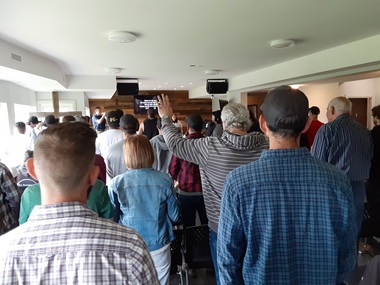
Worship time during a graduation celebration.
Jason thanked Helmut from the front for his decades of service and continued work, though he jokingly worried that he might be out “digging holes” if not properly supervised.
Helmut clearly feels Wagner Hills plays a significant role in fighting addiction. He said:
Out culture needs to hear that there are people getting off drugs. It’s always been about having a higher power to see change.
Wagner Hills is a licensed assisted living facility, with the provincial government covering a per diem for clients who are eligible for social assistance (which covers about one-third of the actual cost).
No monies are received from the Ministry of Mental Health and Addictions. Helmut said that around 2000, the provincial government “wanted to insist on harm reduction.”
Noting that Wagner Hills is abstinence-based, he said:
You can blame the world: ‘It’s just the way I am,’ but we are a light in the darkness, Jesus changes people.
In his book, he wrote:
The concept of a healing, Christian community began to develop in 1998-99 as we transitioned from a treatment-centre model (with patient/staff division) to becoming a Christian community, where the staff-client boundaries were influenced by the goal of being a Christian family.
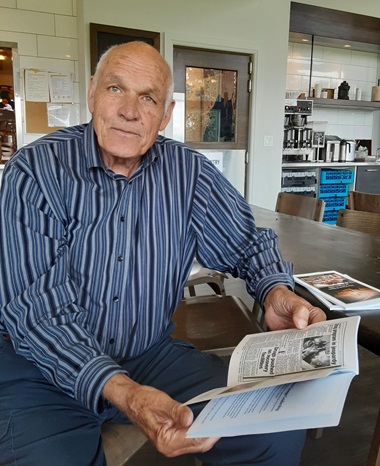
Helmut Boehm in the dining area, holding his book, ‘The Vision & Story of Wagner Hills.’
As far as numbers, he wrote me after the visit:
Wagner Hills began in 1981 serving people in need. The first client/residents came in 1982. We have kept track of all the people who have stayed as residents at Wagner Hills. Some people have come more than once. The number of client/residents is between 5,000 and 6,000.
Currently there are 40 men in the one-year program. There are an additional 15 men (past one-year graduates) in the transition program.
In addition there are an additional 17 staff and family members who live at Wagner Hills. The Wagner Hills community also includes about 20 plus staff plus 40 to 50 volunteers who live off site.
Helmut is not naive about the role of Wagner Hills. Near the end of his book, he writes of those who have been part of the Wagner Hills community over the years:
Are they all well?
Some have died. I thank God for their lives. I release each person into God’s hands.
Some died of a drug overdose. I trust God’s ability to give mercy and to judge righteously.
Some are in jail. I try to see those who would like a visit. May each one see God’s plans that are prepared for us, even if we are incarcerated. May each of us know our need of forgiveness and forgive those who have wronged us.
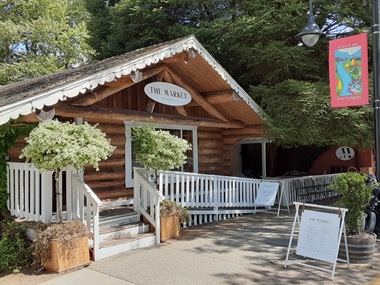
The Market in Fort Langley sells artisan products from Wagner Hills.
Wherever past residents are, I pray that the memory of the time they spent at Wagner Hills and were met and loved by Jesus (or one of Jesus’s friends) would bless them. Love will never give up and it never fails (1 Corinthians 13).
Most past resident are living lives following God’s good plans for them. Many have married and have families, bought houses, combine worship and work, and are a part of God’s church within their community. Almost all current Wagner Hills staff are past residents. . . .
Go here for more on Wagner Hills. And anyone visiting Fort Langley could look into The Market, which sells artisan products produced on the farm.
